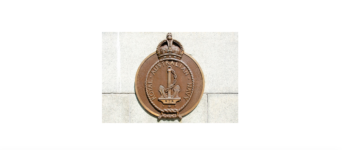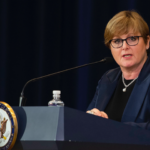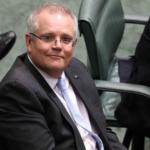Defence Chief Slammed Over Misogynistic Remarks

A former Navy Cadet who was raped repeatedly while in service has responded to a speech given by Australian Defence Force Chief General Angus Campbell, during which he told new recruits that in order to avoid being sexually assaulted, they should not drink alcohol, be out after midnight, be alone, and be attractive.
Erin Brown was just 17 when she embarked on her career in the Navy – a long held goal.
She alleges that within a month, she was sexually assaulted by a senior officer. She says that when she tried to report the incident, a superior officer told her that she only had herself to blame and that she was ‘everything that is wrong with women in defence’.
Erin says her superior also told her that her father – an ex-Navy officer – would be ‘disgusted’ by her, and warned that if anything else happened, she would be kicked out of the Navy..
Erin says she was sexually assaulted twice more before finally resigning, after only 12 months in service.
One incident, she says, occurred in her room. According to Erin, the assailant let himself in, climbed into her bed with her and raped her while holding his hand over my mouth so she could not scream.
Erin wrote an open letter to Chief Angus Campbell this week detailing her allegations – as well as the devastating impact it has had on her mental health.
The letter also conveys her disappointment with Australia’s commanding officer for telling recruits that “women need to change their behaviour” to avoid being sexually assaulted.
Public backlash against General Campbell
Erin is not the only person to have taken offence at the General’s poorly chosen words.
When the speech aired in the media last week – after several very serious allegations within the Federal Government, the backlash was fierce.
Angus Campbell cried that he had been misinterpreted – that he had intended to speak with trainee officers about how to “mitigate risk”.
But many believe there was no misunderstanding; that General Campbell made his point very clearly, twice. Both times, many feel, the General missed the real issue – that there is a significant problem with misogyny under his command.
In fact, General Campbell’s comments reflect a range of cultural issues within the ADF.
In 2016, the Royal Commission into Institutional Responses into Child Abuse heard the ADF has records of 154 reported incidents of abuse within the cadet program dating from 2001 – but also noted that the problem is likely to be much more prevalent given the culture of under-reporting.
His entire rhetoric shows a complete lack of knowledge or understanding about the drivers behind sexual assault – violence, control, and disrespect, along with the very obvious fact that victims don’t necessarily need to have consumed alcohol, be alone, be dressed up, or be out after midnight to be at risk.
Women are not safe – at work or in the community.
Let’s paint the picture more broadly.
The Australian Institute of Health and Welfare reports that in 2018 police recorded around 18,300 sexual assaults against victims aged 15 or over. The number of sexual assaults against women were seven times higher than for men.
Destroy the Joint reports that 55 women were killed across Australia last year by an intimate male partner.
The Australian Human Rights Commission most recent research shows that almost two in five women, and just over one in four men, have experienced sexual harassment in the workplace in the last five years.
Right now, Australia appears to be having its own #MeToo moment, on the back of serious allegations made by several women about the toxic misogynistic culture within the halls of power in Canberra.
The problem is, as evidenced by the recent handling of these allegations, is that the men who are currently in positions of power, who have the opportunity – and widespread societal encouragement – to create real and meaningful change, seem to have very little understanding of the issues facing women – not just in terms of their safety at work, but their safety in our communities.
Prime Minister Scott Morrison needed to get clarity from his wife. Home Affairs Minister Peter Dutton glibly referred to Brittany Higgins allegations as ‘he said / she said.” Angus Campbell stirred up ire from a significant number of Australians.
Where is the national leadership?
Since the allegations made by Brittany Higgins were made public, paving the way for other alleged victims to come forward, Minister for Women, Marise Payne, has been notably silent, with the exception of a couple of media interviews in which she supported the Prime Minister’s handling of the allegations.
This begs the question – where is the national leadership on the issue of violence against women?
The Federal Government is currently biding its time, waiting for the outcomes of various internal investigations. Also at Federal level work is slowly progressing on the National Plan to Reduce Violence against Women and their Children. The National Plan, by the way, was established 10 years ago.
National inquiry
The Australian Human Rights Commission’s national inquiry into workplace sexual harassment made 55 recommendations at the end of last year, none of which have yet been implemented.
Very little progress is actually being made. Disappointing really, when last year we saw during the pandemic how quickly governments can put aside the need for extended research, banter, opposing ideology and political point scoring to act quickly.
Sexual assault, sexual harassment, sexual misconduct and sexual discrimination are all complex issues to solve, but that shouldn’t be an excuse for inertia.
How many more research, studies must be conducted? How many more police and crime statistics should be compiled? How many more victim’s stories need to be heard? Until data collecting is replaced by real action.
The time for change is here. And until there is change, and a full and honest recognition that men, by and large perpetrate assaults against women, there is no hope for a different future, one in which our mothers, sisters, daughters, wives, and girlfriends will be safe not only in the workplace, but within in their homes and on the streets too.







